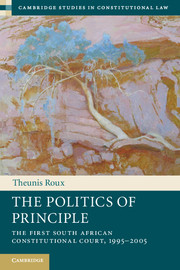Conclusion
Published online by Cambridge University Press: 05 April 2013
Summary
Any power a constitutional court has to influence democratic politics depends on its claim to being, if not above politics, then at least a political actor of a particular type: one whose institutional role is limited to holding other political actors to the terms of the Constitution. The plausibility of any such claim is in turn dependent on the court’s conformance to societal understandings of the methods judges may legitimately use to determine constitutional meaning, alternatively, its capacity to transform these understandings in the course of performing its institutional function. Law in this sense both constitutes and constrains judicial power: whatever lies within the realm of the legal is the court’s legitimate business, and whatever lies without, the forbidden zone of politics. But the boundary between the two is fluid and contested, and there is considerable scope for a court to reposition it in its favour – in the direction, that is, of an understanding that better suits the sustained assertion of its institutional role.
The Chaskalson Court’s achievement, this study has argued, is attributable to the judges’ understanding of this politico-legal dynamic. While the Court’s decision-making record may be criticised for maintaining an overly strict, and at times strained, conception of the law/politics distinction, the judges’ commitment to the liberal-legalist ideal underlying this conception was sincere and genuine. As human rights lawyers under apartheid, they had witnessed firsthand the capacity of law to restrain the abuse of political power. Their reading of the post-apartheid Constitutions as being dedicated to this same goal was defensible on historical and textual grounds.
- Type
- Chapter
- Information
- The Politics of PrincipleThe First South African Constitutional Court, 1995–2005, pp. 387 - 398Publisher: Cambridge University PressPrint publication year: 2013

